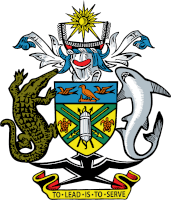The Energy Division is responsible for energy policy, planning and management of the national energy sector. The Division coordinates implementation of energy projects and programmes in the Solomon Islands and advises the Government on developments in the sector. Its functions include:
- Formulation of policy, legal and regulatory instruments and strategic action plans in the deliverance of electricity around the country both in the urban and rural areas;
- Provide advice to the Government in ensuring SIEA’s administration of the pdf Electricity Act (Cap 128) (286 KB) adequately meets national government policy objectives;
- Formulation of policy, legal and regulatory instruments and strategic action plans for the safe storage & handling of petroleum products by administering the pdf Petroleum Act (Cap 81) (217 KB) to ensure that the petroleum product is stored, transported and discharged in a safe manner that conforms to international petroleum industry safety rules;
- The Division enforces annual relicensing of fuel storage facilities. Fuel price control, however, falls under the Consumer Protection and Price Control Act (1995) administered by the Ministry of Commerce, Industries, Labour & Immigration;
- Implements the Government’s international obligation under the Montreal Protocol and its subsequent Amendments to protect the ozone layer. In collaboration with the Customs & Excise Department, the Division enforces control of imports of banned/restricted ozone-depleting-substances that are harmful to the ozone layer;
- Oversees the development of renewable energy sources in the country to alleviate the country’s dependency on imported fossil fuel which a burden to our foreign exchange reserves, contributes to the country’s high cost of energy and which is detrimental to our environment especially the effects of emission of GHG into the atmosphere;
- Implements rural electrification programmes to provide lighting for our rural schools, clinics and communities to improve the livelihoods of our rural dwellers and increase economic activities in the rural areas.
The Energy Division is comprised of the following Units:
Policy, Planning and Management
This section is responsible for the administration and management of the Division. It also deals with energy policy and legislation/regulation and coordinates with other ministries and regional and international organisations in this area of concern. It is also responsible for the planning, budget preparation and coordinates the executive implementation of large renewable energy programmes and projects in collaboration with multi-lateral development banks, donors and Solomon Power. It is also the national focal point for international energy organisations and reports to the Ministry’s Permanent Secretary.
Related Links
Electricity – Rural Electrification
This section is responsible for assessment, design and implementation of rural electrification projects in the country.
Related Links
Renewable Energy
The section deals with the investigation, monitoring and assessment of potential renewable energy resources for development to replace conventional fossil fuel in electricity generation and transportation sector.
Related Links
Energy Efficiency and Conservation
This Section is responsible for the implementation of energy efficiency programmes and projects and deals with Minimum Energy Performance Standards and Labelling for imported electrical appliances.
Solomon Islands’ energy standards comply with the Pacific Appliance and Labelling Standards (PALS) which is a regional program implemented by the Secretariat of the Pacific Community (SPC) and designed to assist Pacific countries implement labelling and standards for energy using equipment.
The Section uses these labelling and standards to guide its issuance of permits for the import of restricted appliances such as refrigerators, freezers, air conditioners and lighting.
The PALS program actively uses a Pacific Appliances Database (PAD) for its processing of permits and works closely with the National Ozone Unit whose key interest is the control of ozone depleting substances that may be produced by some electrical appliances such as refrigeration and air conditioning units.
Related Links
International Energy Obligations
Petroleum and Data Management
This section inspects fuel depots around the country to ensure they meet safety standards and is responsible for re-licensing of fuel storage facilities annually. It works closely with the price control office with Ministry of Commerce, Industries, Labour and Immigration in terms of fuel pricing. This unit is also responsible for energy data collection, works closely with other ministries and inputs energy data to the Pacific Regional Data Repository (PRDR) hosted with SPC.
Related Links
Pacific Regional Data Repository
National Ozone Unit
This Unit is responsible for the implementation and enforcement of the national government’s obligations under the Montreal Protocol and its subsequent amendments. In collaboration with the Ministry of Finance’s (MoFT) Customs & Excise Department, this Unit monitors imports of ozone depleting substances into the country and halts any prohibited substance at the country’s ports of entry. This unit is responsible for raising awareness and dissemination of information of new technologies in the refrigeration & air-conditioning industry to technicians and industry practitioners. The unit is also responsible for issuing of license to importers of controlled ozone-depleting-substances, collects revenue from permits issued to the importers and reports annually to the Ozone Secretariat and United Nations Environment Programme on import data and implementation of the phasing-out of hydro-chloro-fluoro programme respectively.
